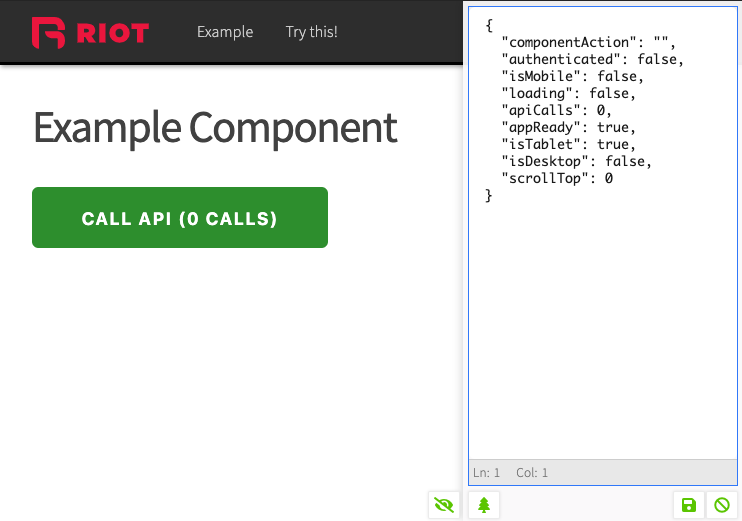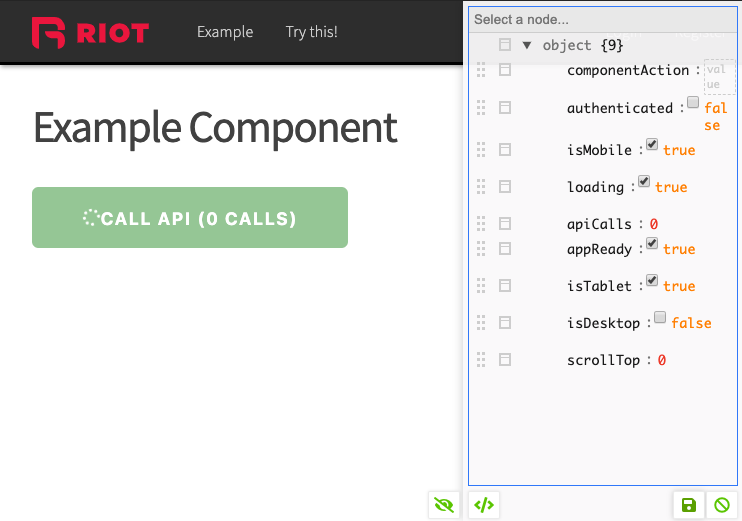Meiosis state manager for Riot using Erre. Learn more about meiosis.
Key things to note:
- Implements a stream to update state
- Comes with a
connectfunction to wrap stream functionality - Components attempt to update when stream is pushed to
- Prevent component updates if state has not changed
- Stream listeners are destroyed when
onBeforeUnmount
npm i --save riot-meiosis
import {
connect,
getState,
createStream,
getStream,
} from 'riot-meiosis';
// Set your initial state.
// State is only mutable via manager API.
const state = {
initial: true,
isNew: true,
mutable: false,
nested: {
hasCandy: true
}
};
// Root state reducer
const reducer = (newState, oldState) => ({
...oldState,
...newState
});
// Create global application stream (can only run once)
const stream = createStream(reducer, stub.state);
// stream is simply an Erre stream
stream.push({
initial: false,
isNew: false
});
console.log(getState());
// > {
// initial: false,
// isNew: false,
// mutable: false,
// nested: {
// hasCandy: true
// }
// }In your .riot files:
<myComponent>
<p if={ hasCandy }>I have candy!</p>
<script>
import { connect } from 'riot-meiosis';
import myActions from './actions';
const mapToState = (appState, componentState) => ({
...componentState,
...appState.nested
});
// Optional mapping of functions or objects to component
const mapToComponent = myActions;
// OR
const mapToComponent = (ownProps, ownState) => myActions;
const component = {
onBeforeMount() {
// connect will respect original onBeforeMount
this.state = {
lala: true
}
}
}
export default connect(mapToState)(component);
// OR
export default connect(mapToState, mapToComponent)(component);
</script>
</myComponent>const {
createStream,
connect,
getState,
getStream,
utils
} = 'riot-meiosis';Simply put, this function returns an Erre stream and sets your global application state. Both stream and state are only ever defined once, so you cannot run this function twice.
Both reducer() and initialState are required. You can set initialState to anything except null or undefined.
reducerfunction, required - Reducer that transforms incoming payloads into global stateinitialStateany, required - Initial app state. Can be set to anything exceptnullorundefined.
Decorator for implement state management on a Riot component. Application state is mapped to Component state, stream updates generate component updates only when there are changes to the relevant state, and component cleans up and stops listening to state changes onBeforeUnmount.
mapToState(appState, componentState)function, required - Function to reduce application state to relevant app statemapToComponent: Optional- object - Map an object to component
- function -
(ownProps, ownState) => ({})- Map a function's return value to component. Receives component props and state. Should return an object.
Returns
Function to pass your component into. The result value is used to export default inside your Riot component and have a component that is conditionally connected to global state.
Returns the application state.
Returns the application state stream.
Utilities used by the library.
utils.arrayMatches(arr1, arr2)- Checks to see if 2 arrays matchstateHasChanged(newState, oldState)- Checks to see if state has changed by recursively matching primitives
Riot Meiosis comes with a dev tool to be able to look into your state and manipulate it directly. Here's how it works:
In your app.js
import { register, component } from 'riot';
import { getStream, connect, RMDevTools } from 'riot-meiosis';
// You must pass it connect and getStream in order
// for it to return a mountable riot component
register('rmdevtools', RMDevTools({ getStream, connect }))In your app.riot or index.html
<html>
...
<footer></footer>
<rmdevtools></rmdevtools>
</html>Examples of what it should look like:
Devtools creates a floating icon on the page to toggle state
By default, you can only view the state unless you choose to edit it
By default, the editor will display as tree view.
You can also swap out your entire state tree by pasting in a JSON string.
After applying changes, a push will be sent to your stream and all connected components affected by the changes will be updated.




